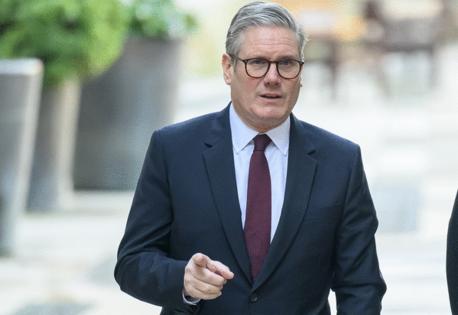Keir Starmer to visit Ukraine to discuss postwar peacekeeping force
Published in News & Features
Keir Starmer will travel to Ukraine in the coming weeks to discuss the possibility of deploying an international peacekeeping force there after the conflict with Russia has ended, his first visit to the war-torn nation since becoming U.K. prime minister half a year ago.
Ukrainian President Volodymyr Zelenskyy announced the plan following a meeting with allies at the Ramstein Air Base in Germany, without saying when Starmer would visit. The U.K. premier is planning to go to Kyiv in the coming weeks as Europe ramps up preparation for U.S. President-elect Donald Trump’s return to the White House, a person familiar with the matter said. Starmer’s office declined to comment.
“This initiative was started by Emmanuel Macron. The British look at it positively, but I will talk in detail with the prime minister about it at our meeting, it will take place,” Zelenskyy told reporters late Thursday. “He will be visiting Ukraine, he will have a visit to Ukraine, and we will talk.”
European leaders have in recent weeks discussed the possibility of sending troops for a peacekeeping mission to Ukraine once a cease-fire is reached, ahead of Trump’s inauguration later this month. He’s promised to deliver a swift resolution to the conflict via a negotiated settlement.
Zelenskyy’s remarks Thursday evening came as Macron and Starmer met for dinner at the U.K. premier’s Chequers countryside retreat. The two men “reiterated their unwavering support” for Ukraine and discussed the importance of ensuring the country is “in the strongest possible position in 2025,” according to a readout from Starmer’s office.
The pair also discussed the potential for a joint peacekeeping force in Ukraine, according to a person familiar with the matter. Such a proposal would depend on a negotiated peace deal between Ukraine and Russia, which President Vladimir Putin has so far shown no willingness to discuss.
A possible peacekeeping mission would come at a later stage of negotiation, once a cease-fire is achieved, to avoid any risk of escalation, Bloomberg previously reported.
—With assistance from Samy Adghirni.
©2025 Bloomberg L.P. Visit bloomberg.com. Distributed by Tribune Content Agency, LLC.







Comments